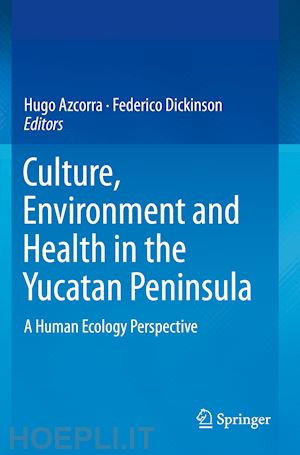
Questo prodotto usufruisce delle SPEDIZIONI GRATIS
selezionando l'opzione Corriere Veloce in fase di ordine.
Pagabile anche con Carta della cultura giovani e del merito, 18App Bonus Cultura e Carta del Docente
This book adopts a human ecology approach to present an overview of the biological responses to social, political, economic, cultural and environmental changes that affected human populations in the Yucatan Peninsula, Mexico, since the Classic Maya Period. Human bodies express social relations, and we can read these relations by analyzing biological tissues or systems, and by measuring certain phenotypical traits at the population level. Departing from this theoretical premise, the contributors to this volume analyze the interactions between ecosystems, sociocultural systems and human biology in a specific geographic region to show how changes in sociocultural and natural environment affect the health of a population over time.
This edited volume brings together contributions from a range of different scientific disciplines – such as biological anthropology, bioarchaeology, human biology, nutrition, epidemiology, ecotoxicology, political economy, sociology and ecology – that analyze the interactions between culture, environment and health in different domains of human life, such as:
Culture, Environment and Health in the Yucatan Peninsula – A Human Ecology Perspective will be of interest to researchers from the social, health and life sciences dedicated to the study of the interactions between natural environments, human biology, health and social issues, especially in fields such as biological and sociocultural anthropology, health promotion and environmental health. It will also be a useful tool to health professionals and public agents responsible for designing and applying public health policies in contexts of social vulnerability.
Chapter 1 – Introduction
Chapter 2 – The thin broken line: History, society, and the environment on the Yucatan Peninsula
Part I: Living conditions and human biology
Chapter 3 – Globalization and children’s diets: The case of Yucatan, Mexico
Chapter 4 – Growth stunting and low height-for-age in the Yucatan Peninsula
Chapter 5 – The urban Maya from Yucatan; dealing with the biological burden of the past and a degenerative presentChapter 6 – A critical biocultural perspective on tourism and the nutrition transition in the Yucatan
Chapter 7 – Effect of salaried work in cities and commercial agriculture on natural fertility in rural Maya women from the Yucatan Peninsula, Mexico
Chapter 8 – Association between early developmental stress, as evidenced by linear enamel hypoplasias (LEHs), and body composition during adolescence in agricultural populations with different access to store foods and gendered activity patterns
Chapter 9 – Hydration, lactation, and child health outcomes in Yucatec Maya
Chapter 10 – Patterns of activity and somatic symptoms among urban and rural women at midlife in the state of Campeche, Mexico
Part II: Human ecology from a bioarchaeological perspective
Chapter 11 – Environmental and cultural stressors in the coastal northern Maya lowlands in pre-Hispanic times
Chapter 12 – History of health and life of pre-hispanic Maya through their skeletal remains
Chapter 13 – Crossing the threshold of modern life. Comparing disease patterns between two documented urban cemetery series from the city of Merida, Yucatan, MexicoPart III: Environment and health
Chapter 14 – Health and wellbeing in the Yucatan Peninsula revisited with a human ecology perspective
Chapter 15 – Hair mercury content in an adult population of Merida, Yucatan Mexico as a function of anthropometric measures and seafood consumption
Chapter 16 – Tackling exposure to Chagas Disease in the Yucatan from a human ecology perspective
Chapter 17 – Conclusions











Il sito utilizza cookie ed altri strumenti di tracciamento che raccolgono informazioni dal dispositivo dell’utente. Oltre ai cookie tecnici ed analitici aggregati, strettamente necessari per il funzionamento di questo sito web, previo consenso dell’utente possono essere installati cookie di profilazione e marketing e cookie dei social media. Cliccando su “Accetto tutti i cookie” saranno attivate tutte le categorie di cookie. Per accettare solo deterninate categorie di cookie, cliccare invece su “Impostazioni cookie”. Chiudendo il banner o continuando a navigare saranno installati solo cookie tecnici. Per maggiori dettagli, consultare la Cookie Policy.